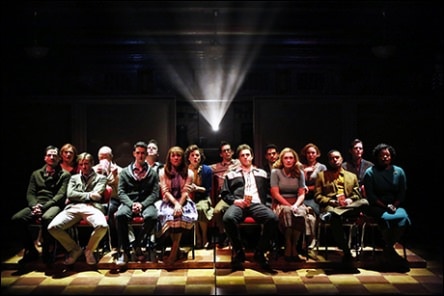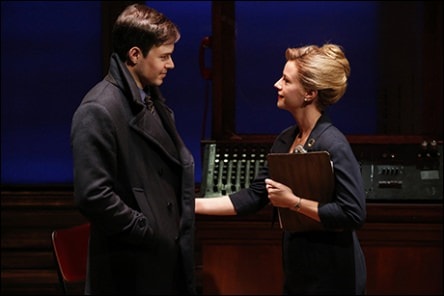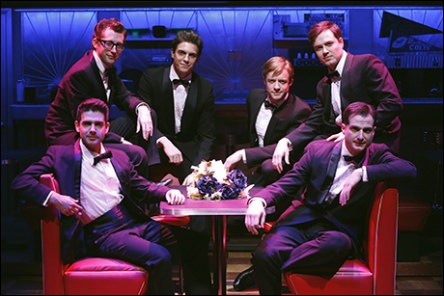In 1982, when Barry Levinson’s Diner (the film) opened nationwide to positive reviews, the Reagan Revolution had just begun, the Vietnam Syndrome was about to be dispelled with the invasion of Grenada, and the final episode of M.A.S.H. was in the works.

Thirty-two years later, as the long awaited world premiere of Barry Levinson’s Diner (the musical, with music and lyrics by Sheryl Crow) opens at Signature Theatre, much has changed in America. The Reagan Revolution has utterly transformed America’s economic landscape, the lessons of Vietnam are is but a memory kept on life-support by a few 1960’s holdovers, and socially topical popular culture like M.A.S.H. is either in the archives or playing on subscription cable TV.
What Diner (the musical) proves is that sometimes 32 years is more like eons than decades and sometimes what makes a fairly good movie does not translate into a decent musical.
Diner (the musical), with its strong cast and great voices, simply has too many hurdles to overcome in its story and context to make it a thrilling evening at the theatre. Perhaps a major overhaul of the stories might save it, both from too much randomness and too little substance, but that’s another story all together.
Let’s start with the play’s contextual hurdle, its sexism. To be fair the narrator, Boogie (the elder), played with sophistication by John Schiappa, acknowledges that most of the male characters in the musical are sexist, unabashedly so, and have little to no ability even to recognize lovers, mothers, or female friends even as human beings.
Now, such sexism dominates the popular TV show Madmen, but that show’s sexism does not hide the social and psychological damage such violence reaps on both its victims and its perpetrators. As a result, Diner’s romanticized version of sexism’s dehumanizing paradigm can at times be difficult to stomach.
One could, of course, argue that in the narrative summation of the characters’ lives, expressed to us by the older Boogie, the women’s true value is valorized. Unfortunately, we experience little of that transformational verve in the actual lives of the characters on stage.
And here is where the weaknesses in Levinson’s book moves front and center.
The film’s vignette style narrative depended in large measure on the authenticity of its dialogue to create an audience-endearing tapestry of friendship. As a result, movie-goers could fall in love with its characters (helped in no small measure by the charisma of its star-studded cast).
The musical has no authenticity of dialogue and very few songs that develop the “bro-mance.” As a result, the screenplay’s weaknesses in plot dominate the stage version. For the most part the vignettes do not advance the story and give us little opportunity to develop real connections to its characters.
Diner primarily develops five character-driven plots, weaving together key moments from each into a montage of sorts.
The story of the younger Boogie dominates the action. Played by the forever “cool” Derek Klena, Boogie has a gambling problem and very little street-sense. He makes a bet that he cannot afford to lose. Of course, he loses. He proves to be a crude womanizer as well, first with the beautiful Carol Heathrow (played demurely by Colleen Hayes) and then with his good friend’s wife, Beth, (played with simmering desperation by Erika Henningsen). When he finally decides to be “good” and show a little respect to women, the scene or song that might have made his transformation clear never materialized.
Then we have Beth’s husband, Shrevie, played with beatnik geekishness by Josh Grisetti. Shrevie and Beth had all the thrills of pre-marital sex. Before marriage, sex was all they talked about: when and how to have it; why they could have it. After marriage, they were supposedly having sex without having to talk about it. Thus, they had nothing else to say. Now, there’s a happy marriage.
One of the best scenes of the evening is between Shrevie and Beth. Beth has messed up his record collection, not understanding its organizing principles, but more importantly not understanding his depth of passion about music. On the other hand, Shrevie does not have a clue about Beth, her desperate loneliness and lost dreams.
In the song that follows, “Tear Down This House,” we get a chance to experience first hand the volcanic anger brewing underneath these 1950’s young women, and Ms. Henningsen’s rendition of the piece is superb.
Unfortunately, those scene-song combinations are rare in Diner, and frequently the storylines are resolved with a whimper and not a bang.

Another central plotline involves the impending marriage of Eddie (played with a weaselly good nature by Adam Kantor) and Elyse (played with brooding patience by Tess Soltau). Eddie has made a precondition of their marriage Elyse’s ability to pass a football test on the hometown Baltimore Colts.
Although this element was not nearly funny enough to hide its totally degrading subtext, the audience never had the opportunity to witness the story’s resolution. We were simply told the resolution without a song or a scene that revealed the demise of Eddie’s pigheadedness.
Then we have the story of Billy (played by the sensitive Aaron C. Finley) who has fallen in love with the musical’s true feminist, Barbara (play with determination by Whitney Bashor). Two old friends from high school, a flirtatious evening in New York ends with the conception of a child. Grad student Billy wants marriage; career-minded Barbara wants to go back in time.
The audience experiences too little of this plotline to make it meaningful, although Billy’s song “Please Be There” and Barbara’s song “Don’t” left me wishing there were more.
Finally, we have the one trust-fund kid in this crew of working class lads, Fenwick (played with drunken arrogance by Matthew James Thomas). Cut off from his family because of his alcoholism, we watch him spiral out of control. His song “Last Man Standing” that ends Act I is a roaring plea for help although, for the life of me, I cannot figure out where those three wise men came from.
The final male friend in this gang of six is Modell (played with a goofy seriousness by Bryan Fenkart). He does not have a storyline of his own. Instead, he hitches a ride on Eddie’s shirttails and goes wherever he goes.
The rest of the large 20 plus-ensemble played numerous roles, most notable among them the Doo Wop Guys (Ben Lurye, Mitch Marois, David Rowen, Lou Steele) who sang the theme song “Now and Then.”
The six-person orchestra is headed by conductor Lon Hoyt on piano with Ben Bokor of Saxophones, Victor Simonson on keyboard, Dan Hovey on Guitar, Bill Hones on Bass, and Joe McCarthy on drums. Their Doo Wop style musical numbers kept the action lively and entertaining.
Kathleen Marshall’s direction and choreography is subdued, which for Signature’s intimate confines is totally appropriate.

Scenic Designer Derek McLane has created an extremely versatile space for Diner, that allows for multiple locations and a roomy diner as well. James Kronzer adapted the scenery for Signature’s The Max. Peter Kaczorowski’s lights provides a good deal of energy to the action and Paul Tazewell’s costumes were appropriately doo wop. A special nod to wig artist Charles G Lapointe is in order.
World premieres are never easy, and world premiere musicals are the worst. Diner’s unique cinemagraphic style does not translate easily to the stage.
In the end, a story about six male friends and their final days together in a 1959 diner became a story about five separate men, their several love affairs, and their tense sexist dynamics with women.
They might work it all out by the end, but this musical is going to have to focus a lot sharper if it’s ever going to deliver the goods.
Running Time: Approximately 2 hours and 30 minutes, with one 15-minute intermission.
Diner plays through January 25, 2014 at Signature Theatre – 4200 Campbell Avenue, in Arlington, Virginia. For tickets, call the Box Office at (703) 820-9771, or purchase them online.
LINK
David Siegel reviews Diner on DCMetroTheaterArts.




